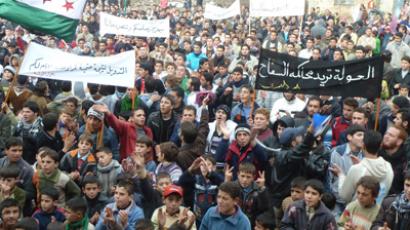UN gets involved: Arab League gives up on Syrian crisis?
The UN Security Council is expected to vote over the next few days on the Western-Arab draft resolution aimed at making President Assad cede power, paving the way for a coalition government with the opposition.
It comes as the Arab League's monitoring mission to Syria suffered a setback after six countries pulled out, calling on the UN to act.UN diplomats say France, Britain and Germany have been working with Arab nations on a new Security Council resolution on Syria, the main goal of which, they say, is a democratic transition from President Bashar al-Assad's 11-year regime.But their appeal to the UN does not seem to change the situation radically, as Russia remains firmly opposed to intervention and the imposition of sanctions against Syria.Foreign minister Sergey Lavrov reiterated Russia’s position once again on Wednesday, saying it will veto any Security Council resolution that would allow foreign military intervention."We cannot support proposals under which unilateral sanctions are imposed against Syria without any consultations with Russia, China and other BRICS countries," Lavrov said on Wednesday.Calling the moves by the UN Security Council against Syria "unfair" and "counter-productive," he said that Russia is also ready for dialogue with its partners in the Security Council.Indeed, Russia presented its own draft of a UN resolution regarding Syria. And as Lavrov said, it remains on the table. It is expected, however, that the new draft will replace the Russian text, which Western diplomats say is too weak and no longer relevant in light of the Arab League’s call for Assad to hand power to his deputy.Saying their goodbyes and heading home.The observers from the Gulf States headed for the airport, their mission incomplete, leaving behind a country in a deepening crisis.It was never going to be easy…“We don’t want the Arab League to stay,” protesters say. Right from the word ‘go’ the mission proved problematic as the opposition accused the monitors of being too closely aligned with the government. Now the government has accused them of being part of a “foreign conspiracy.”And there were logistical complaints too. The observers seemed ill-equipped and too few to undertake such a major task.But if things were bad at the beginning, now they seem even worse.Following in Saudi Arabia’s footsteps, all the Gulf States withdrew their observers after Damascus rejected their recent proposal that President Assad cede power to a deputy and form a unity government.“It’s interesting these countries talk about democracy in Syria but don’t have democracy themselves. This is funny. If I talk about Syria – ok, we’ll have a new constitution, we are going to be a more democratic country, multi-partied – but what about Saudi Arabia? The West can’t talk about Syria and leave Saudi Arabia as it is,” says Dr. Bassam Abu Abdullah from Damascus University.Damascus’s rejection was no surprise. Both sides in the conflict have shown an equal unwillingness to soften their stance – even though it’s meant the daily death toll in the country continually rising.The killing of the head of the Syrian Arab Red Crescent whilst on the road to Damascus was yet another reminder of the spiraling situation.The withdrawal of the observers at such a crucial moment in the country’s crisis is seen by some as controversial.With reports of the continually growing death toll in the conflict, the earlier proposal being floated of increasing the numbers of observers on the ground and providing them with UN training could have been a lifesaving one.But now those plans have been put on hold.In fact, much of the substance of the report – that named grave abuses on both sides – seems to have been lost in the flurry of diplomatic activity.Now France and Britain have joined forces at the United Nations calling for an end to President Assad's rule.Having waved goodbye to their Gulf State colleagues, some observers remain – but it’s small consolation.“Syria didn’t close the doors on the Arab League and I think Syria will give anyone the chance to help Syrians but the last decision is in the hands of the Syrian people – not the Arab League and Security Council – through national dialogue and through reforms,” says Dr. Bassam Abu Abdullah. Although Damascus allowed the mission to be extended for another month and the observers officially saying they can continue with their task, behind the scenes things are much less optimisticAnd with deep divisions – both regionally and internationally – over what action to take to end the violence, hopes of ending the crisis seem to be slipping further and further out of reach.














